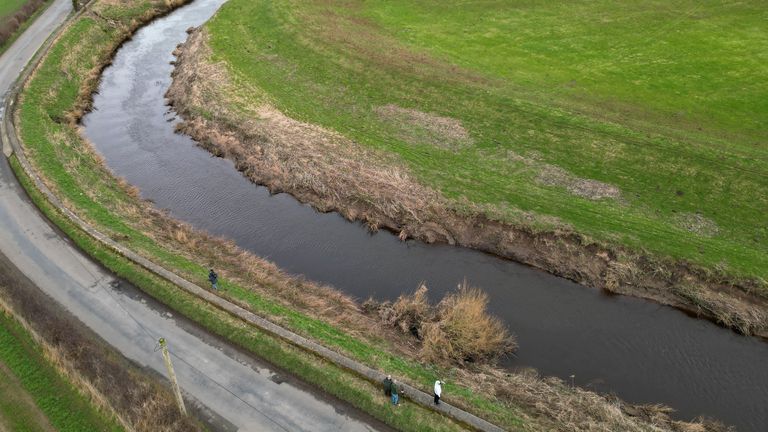Police who investigated the disappearance of Nicola Bulley from beside a riverbank have been heavily criticised in a damning report.
Lancashire Police’s decision to reveal the mother-of-two’s mental health issues was condemned as “avoidable and unnecessary”.
Senior officers were also criticised for their initial failure to help her family, first by not appointing family liaison officers and then by not advising them on how to deal with requests from media with whom they wanted to engage.
The force didn’t cordon off the area where Ms Bulley vanished or conduct a full forensic search – after deciding early on she was not the victim of a crime.
It was eventually shown she did die accidentally, but the original hypothesis might have been wrong.
Police didn’t control the involvement of Peter Faulding, the search specialist brought in by the family to help when they became frustrated at the police failure to find Ms Bulley.
He was allowed to brief the media and has since told Sky News his sonar equipment detected Ms Bulley’s body within minutes, but police divers failed to find her at the same spot.
He insists he found her body less than 100 metres from the riverside bench where she was last seen, but the police dive team said all they found there were branches of a tree.
The force should have declared Ms Bulley’s disappearance – as she walked her dog in a field at St Michael’s-on-Wyre – straight away as a critical incident, said the report.
That would have ensured stronger leadership and a greater media focus, signalling the force’s full commitment to the investigation, said the review by the National College of Policing, which sets standards and training for all forces in England and Wales.
Ms Bulley was last seen on the bank of the River Wyre after dropping her children off at school on 27 January this year. Her body was found on 19 February.
The report praised the police force for its conduct and resourcing of the investigation and search, noting that one adviser predicted Ms Bulley’s body would rise to the surface around three weeks after she vanished and be easier to locate, which is what happened.
The force correctly identified her quickly as a “high-risk” missing person.
‘Avoidable’ release of personal information
Towards the end of the search police revealed, in a press release, that Ms Bulley had significant problems with alcohol brought on by her struggles with menopause.
The NPC’s chief executive officer Andy Marsh said there was “substantial learning” for the Lancashire force.
He said: “The release of personal information about Nicola remains the most controversial aspect of the investigation.
“The constabulary missed several opportunities during the investigation to remove or reduce the requirement to disclose further information about Nicola’s vulnerabilities.
“It should have anticipated that this information would be requested or would come to light from another source.
“In our view, despite it being lawful, the release of this highly sensitive information by the constabulary was ultimately avoidable and unnecessary.”
At an early news conference journalists had asked if Ms Bulley had any personal issues that might explain her disappearance, but a senior officer said she had none.
The report said the force should have briefed reporters confidentially that she was vulnerable and given more regular updates on their investigation.
The report concluded: “The failure to brief the mainstream media on a non-reportable basis on this information, or to adequately fill the information vacuum, allowed speculation to run unchecked.
“This led to an extraordinary increase in media and public interest in the case, which was fuelled by several newsworthy elements.
“This included the apparent mystery of why Nicola had disappeared, leaving behind her dog and leaving her mobile phones still connected to a Microsoft Teams call.”
Questions of competence
Among its other conclusions, the report said: “Operational and senior decision makers within Lancashire Constabulary did not either recognise or act to prevent the detrimental impact of the investigation’s high-profile nature.
“This led to serious questions being raised about the competence of – and public confidence in – Lancashire Constabulary.”
The force didn’t appreciate the influence of social media and the impact on its investigation, with people visiting the search sites and posting their own theories.
Mr Marsh also highlighted the police’s “fractured” relationship with journalists nationally and urged the rebuilding of trust between officers and reporters.
Read more from Sky News: Four young men missing in North Wales
Lancashire’s police and crime commissioner Andrew Snowden said: “I hope today’s report reassures Nicola’s family that Lancashire Constabulary carried out a professional and extensive investigation and, despite important learnings highlighted in the report, none of these actions would have changed the outcome of this tragic case.”
Ms Bulley’s partner Paul Ansell and other family members declined, for personal reasons, to take part in the review.
And it notes: “The review was unable to discuss the investigation with the chief officer who was involved in the investigation from 30 January to 5 February, due to their retirement.”
The report made 16 recommendations and asked the police force for a detailed action plan to be delivered in January.


